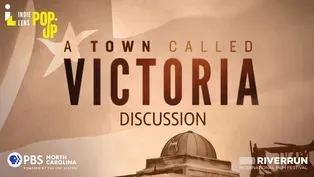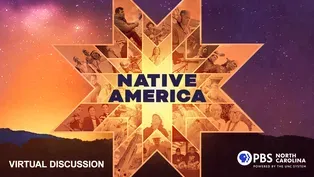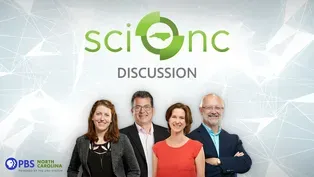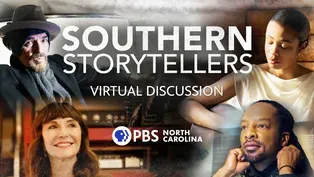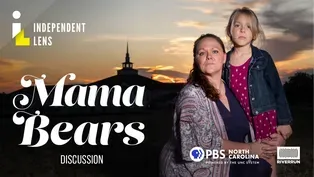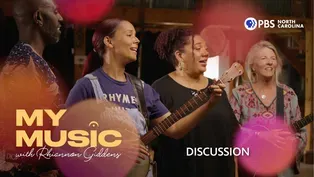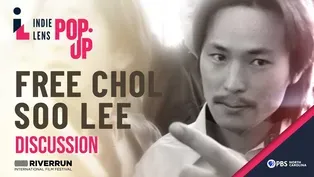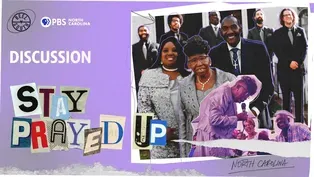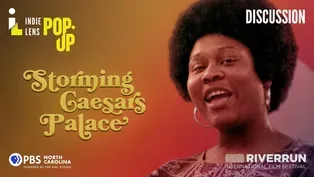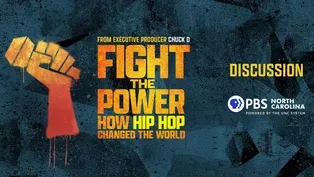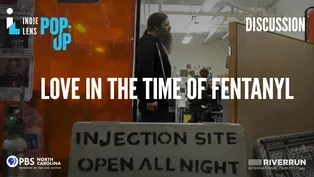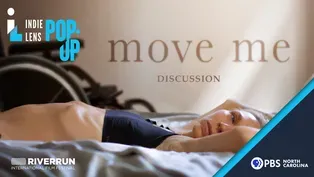PBS North Carolina Specials
Discussion | The U.S. and the Holocaust
9/12/2022 | 1h 8m 54sVideo has Closed Captions
Local experts and leaders discuss the film & the U.S. response to the Holocaust.
PBS North Carolina CEO David Crabtree leads a conversation with local faith and non-profit leaders and scholars about the U.S. response to the Holocaust. Our panelists: Dr. Racelle Weiman, Appalachian State; Dr. John Cox, UNC Charlotte; Rabbi Eric Solomon, Beth Meyer Synagogue; Rabbi Eliezer Sneiderman, Greensboro Jewish Federation; and Abby Lublin, executive director, Carolina Jews for Justice.
PBS North Carolina Specials
Discussion | The U.S. and the Holocaust
9/12/2022 | 1h 8m 54sVideo has Closed Captions
PBS North Carolina CEO David Crabtree leads a conversation with local faith and non-profit leaders and scholars about the U.S. response to the Holocaust. Our panelists: Dr. Racelle Weiman, Appalachian State; Dr. John Cox, UNC Charlotte; Rabbi Eric Solomon, Beth Meyer Synagogue; Rabbi Eliezer Sneiderman, Greensboro Jewish Federation; and Abby Lublin, executive director, Carolina Jews for Justice.
How to Watch PBS North Carolina Specials
PBS North Carolina Specials is available to stream on pbs.org and the free PBS App, available on iPhone, Apple TV, Android TV, Android smartphones, Amazon Fire TV, Amazon Fire Tablet, Roku, Samsung Smart TV, and Vizio.
Providing Support for PBS.org
Learn Moreabout PBS online sponsorshipMore from This Collection
Discussion - A Town Called Victoria - Independent Lens
Video has Closed Captions
The filmmaker and former Victoria residents share their story. (46m 51s)
Discussion - Native America Season 2
Video has Closed Captions
Panelists discuss preserving the languages of Native American tribes. (39m 1s)
Video has Closed Captions
Sci NC executive producer and host, Frank Graff, chats about upcoming Season 6 of Sci NC. (26m 6s)
Discussion - Southern Storytellers
Video has Closed Captions
Author David Joy and others discuss storytelling and their new PBS series. (42m 13s)
Discussion - Mama Bears | Independent Lens
Video has Closed Captions
Producer and director Daresha Kyi discusses the film and LGBTQIA+ advocacy. (34m 41s)
Discussion - My Music with Rhiannon Giddens
Video has Closed Captions
Discussing the series with producers Will & Deni McIntyre and country artist Rissi Palmer. (39m 56s)
Discussion - Free Chol Soo Lee | Independent Lens
Video has Closed Captions
Local lawyers, professors and nonprofit leaders discuss wrongful convictions and reentry. (40m 44s)
Discussion - Stay Prayed Up, Reel South
Video has Closed Captions
The filmmakers discuss their journey with Mother Perry and The Branchettes. (45m 4s)
Discussion - Storming Caesars Palace | Independent Lens
Video has Closed Captions
Local professors and nonprofit leaders discuss welfare and the social safety net. (33m 2s)
Discussion - Fight the Power: How Hip Hop Changed the World
Video has Closed Captions
Local experts discuss the history of hip hop with PBS North Carolina. (59m 43s)
Discussion - Love in the Time of Fentanyl | Independent Lens
Video has Closed Captions
Local harm reductionists, therapists and others discuss the opioid crisis and more. (55m 44s)
Discussion | Independent Lens: Move Me
Video has Closed Captions
A dancer with blindness and disability advocates discuss adaptable arts programs. (38m 46s)
Providing Support for PBS.org
Learn Moreabout PBS online sponsorship- Hello and good evening everyone.
I'm David Crabtree the CEO here at PBS NC.
We thank each and every one of you for joining us this evening.
What a powerful 43 minutes we've had, of course, very difficult to watch at times yet that is why we bring this to you because history has its way of resharpening our lenses, making us look at ourselves differently and asking a lot of questions.
So I want to do introduce our panelists tonight because we have a marvelous group gathered to walk us through history, particularly with what we've just seen.
Rabbi Eric Solomon of Beth Meyer synagogue here in Raleigh, Dr. Racelle Weiman the Co-Director of the Martin & Doris Rosen Symposium on the Holocaust in the Center for Judaic Holocaust and Peace Studies at Appalachian State.
Dr. John Cox is the Director of the Center for Holocaust Genocide and Human Rights Studies and Associate Professor Department of Global Studies at the University of North Carolina, Charlotte.
Rabbi Eliezer Sneiderman, Director of Community Relations, Shalom Greensboro, and the Greensboro Jewish Federation.
And Abby Lublin, the Executive Director of Carolina Jews for Justice.
And Abby, I wanna begin with you as we look at social justice today, and we try to look at social justice for Jews all those decades ago, how do you grapple with a question of why the United States did not do more with what it knew at the time?
- Whew, David, there's no warm up here.
I am happy to delve into that question.
I just wanna first acknowledge what folks might have just viewed for the 43 minutes of that screener.
And I just wanna take a moment to acknowledge what witnessing trauma can do to the body.
And so people might feel a bit re stimulated or affected by what we just witnessed.
I just wanna take a moment to notice how that might live in our bodies.
And I just invite everyone panelists, viewers, moderators tech support to just maybe take a breath and just.
[sighs] Yeah, our bodies often know more than our analytical minds do certainly before they do and no good decision making or really coherent commentary on a panel comes from that kind of trauma.
So I just wanna take a moment to just notice how it lives in our bodies.
And I also, I know this isn't the question you asked, but Carolina Jews for Justice we often lead with gratitude.
So I just wanna take a second to thank PBS for investing in this kind of educational material that's currently at threat by many state legislatures and some school boards.
PBS knows that we can revisit things that we think we know and that we assume to be true.
There's a lot of wisdom granted with time.
So I think I might be doing your job here, David, but I just wanna thank PBS and encourage people to continue supporting this kind of programming that adds nuance and complexity to our understanding.
It's a much bigger question that I'm excited to hear from all the panelists.
I don't know if this question is posed to everyone, but the question of why I believe you asked why the US didn't do more in a social justice perspective to intervene in the Holocaust.
Am I correct in reframing that question?
- Yes.
- Yeah, so what I know this film does in looking at the screener and also talking to some folks involved in making this film and some scholars is that we have to understand decisions and policies in the context of their time, right?
And so to expect the United States in the 1930s and '40s to intervene in a humanitarian plight of a minority of people in the United States while itself was invested in disenfranchising US citizens and Americans is a bit impossible, I think.
And so we can understand.
Yeah, I wanna start there with we can only expect the policies and the politics of the political environment that exists and the political environment that existed in the '30s and '40s did not sustain investing in humanitarian intervention or certainly supporting Jews and other folks targeted for extinction in Eastern Europe.
And I think I'll just stop there and pass it to my fellow scholars and activist, historians and then I'd love to revisit this.
Thank you.
- Well, let me add a little to that if I may.
- Sure.
- Dr. Weiman-- - I didn't know I was in the hot seat first.
- Dr. Weiman, I'd like to go to you because you teach teachers how to teach in public schools about the Holocaust.
So with that lens and the framework of looking back into the '30s and '40s of why the United States didn't do more, I wanna add to that and ask, is there any way to begin to calculate how many Jews and other refugees might have been saved?
- I like Abby.
I want to first of all I express gratitude to Ken Burns and PBS for finally focusing on America in the Holocaust, because it is important to the success of the Holocaust.
The fact that the Holocaust could never have happened if the rest of the world did not stand idly by I'm convinced of it.
The Holocaust happened because at each time when the 12 years that the Nazis were in power, they'd keep looking over their shoulders and saying, can they get away with more, can they get away with more the Nuremberg Laws in 1935 and then one will go after another and the fact of the turning back or that not that no one would care, no one would be interested in getting involved.
The isolation attitudes and the behavior between the two wars.
The fact that some very popular figures like Charles Lindberg and Father Kauflin and Henry Ford were people that were not only antisemitic and isolationists, but in fact, were people that had the ear in the eye of many people.
There was a lot of things that happened that when you talk about the numbers, when the 6 million were killed, those who were targeted for death, the Jews, and ultimately the Roman Sinti were the people who were not only were expendable, they were abandoned as David Sleiman different name and different generation than me.
But when he began to study the paper walls, the ways of impossible to get into the country, and then later on the many policies that were possible that not only the immigration or the refugee status or setting up even temporary camps, or even opening up territories, there were so many possibilities that were missed opportunities that America and the allies did not get involved.
Again, I did not have the privilege of seeing all six hours yet, and I can't wait to see all of them.
Obviously there's many things that they couldn't put in six hours.
There's so many details over those years of many people, Jews and Gentiles together that fought and yelled and screamed from rooftops to please do something, to get active that they themselves ran rescue missions without the support of the interest of the US government or even the US policy.
There was so much possible.
So you always say even one life, you always say of the 1.5 million Jewish children that were targeted, how many times it was possibility.
They mentioned some of the children just two times 10,000 children that itself was rejected by the US government.
And since we're talking about, we're talking from North Carolina was in North Carolina, Senator Reynolds, that started that absolutely was the biggest campaigner against that act.
So we not only should we look at America, but if we're talking about North Carolina, I asked them to even look at North Carolina history and the amount of antisemitism, racism that was in our government and was in the Democratic Party.
So came from all sides and all sectors.
What was important to understand is that if one decided that they wanted to do something to scream to start to speak out, to help save lives, it was possible even within the context of the depression of between wars because so many that did, they were successful, they were successful in many different levels and many different places against the tide.
And when finally there was some action, the very tell end when the hundred thousand Budapest Jews were in danger, that with a little bit of money that was finally released from the US treasury by donors, including my grandfather, a bagel baker who had five children would continue to put money aside to help save Jews in Europe.
Finally, that money was released to a Swedish diplomat, Rawl Wallenberg, who will be mentioned, I'm sure in this film and finally action was happened because all this items is possible.
And I continue to say, if they thought this was value, it could have happened.
It could have happened in great terminology and it isn't just about opening the gates of America.
It was about warning the people there about including 22 nations that were invaded to get involved and to realize that this is not acceptable behavior.
They got away with it because no one said anything.
- Rabbi Solomon, you and I have talked about this before, about no one speaking up, we can look back at history again, through that lens and not excuse the lack of speaking up, but it's explained in a way that we could not have understood.
We just could not have comprehended the atrocities that were happening.
Now we know and with what we see even today, do you think people are awake or are they lulled into thinking nothing, nothing even close to this could ever happen again?
You need to unmute your mic.
No, we're not hearing you.
So while do you work on that, let me go to Professor Cox for a moment.
And John, I want to ask you I'll come back to the question we were asking Eric, but I want, because Dr. Weiman brought up immigration and the problem of immigration that we saw 80 years ago, we obviously are living in a world where that issue continues to impact this country.
It's nothing new.
- Well, yeah, exactly.
No, I mean, from the dawn of time people who've moved around, but just this refers back to that initial question.
That was definitely, I think, a key factor, maybe the key factor in the '30s and late '30s into the early '40s that really shaped US policy was a xenophobia and anti-immigrant bigotry and prejudice.
And there are many folks who try to apologize or justify Roosevelt's lack of action by depicting him as a prisoner of public opinion.
And I really don't agree with that at all because... And as a Russel made a good point about that, much more could have been done and very little was done.
In fact, there were some things that could have been done without any imagination or whatsoever, such as simply fulfilling quotas that were set for German refugees in the 1930s, by allowing German Jews into this country.
There were about a half a million German Jews in 1933, certainly by late 1938 after the Kristallnacht pogrom of November 38, most German and Austrian Jews were trying to get the hell outta there by that point, if I may say, and a door was slammed on their faces, not just by the US, but by many other countries.
And a lot of this stems... Well, it stemmed from a lot of things that we don't have time to talk about, but I'll just say that there was a very harsh anti-immigration policy passed in 1924 that was enforced for 41 years, 40 years before that was the anti-Chinese Exclusion Act.
All Chinese people were prevented from coming to this country for 62 years under that law.
So early on in this video, excerpt that we saw someone says something like, exclusion is as American as apple pie.
And I thought that was a powerful and accurate statement.
We like to pride ourselves here in the US about being a country of immigrants, which is also kind of odd because African Americans didn't come here as immigrants and there's also some people here called native peoples, indigenous peoples who saw Europeans coming over here as colonizers et cetera.
If I can just make one another tiny point, oh, there's a lot to talk about.
But it should be known that the US collectively or in terms of policy has not learned anything over the last 77 years, because only 11 years ago, when the Syrian wars began in 2011, then again, the US did not allow hardly any Syrians into this country.
Only 10,000 over the next several years, while literally millions ended up in very small, poor countries such as Lebanon and Jordan.
And believe it or not, and I hope this comes too in the Ken Burn series, in the mid to late '30s, there were many American policy makers and politicians who said that we cannot allow German Jews into this country because they might be agents of Hitler.
Yes, that sounds pretty far out, but 11 years ago, and up to the present moment, there are still policy makers and politicians who say, we cannot allow Syrians in here 'cause they might be agents of ISIS.
And because Islam is a foreign alien unAmerican tradition as Jews were considered alien foreign, et cetera, et cetera in the '20s and '30s.
- Rabbi Solomon is back with us now.
So Eric, I think you're with us with audio.
No, we're still having that audio problem.
We'll continue to try to correct that.
Continue to try to correct that.
Rabbi Sneiderman, you have spent a lot of time studying history and studying how we are, where we are and where we are not.
But looking back at history, how would you evaluate President Roosevelt in this?
- Whoa, I think as Dr Weiman said, Roosevelt could have done more.
He didn't do a lot.
I guess we have to say that, thankfully we did what we did.
We did fight the war.
We did defeat the Nazis and there were small amounts of refugees that were led into the United States.
I guess we should be thankful for what we got, but it definitely could have been much more.
It's a disappointment.
- Yet he was also dealing with the depression, at least through 1930s.
That was the major problem facing this country at time.
Is there any room for him to not in any way, get a pass on this, but to be understood differently because of what was happening domestically?
- Yeah, I think he didn't want to affect the war effort and he didn't want to affect the new deal so if we wanna look at him favorably, that's how we understand it, but he definitely could have done more.
I think there's a challenge of any leader, how do we lead?
How do we get our society to a place where they're not.
Are leaders, are they at the back and wheel of the masses?
Do they follow the base or can they through using the bully pulpit and explaining to people where we should go, that that's what leader needs to do.
A leader needs to lead and direct the people to go places maybe they're not comfortable with.
- Abby, why is it such an uphill battle?
[Abby sighs heavily] - Which it are you talking about?
There are many its here.
- Well, and just listening to Rabbi Sneiderman there for a moment and talking with people, maybe following the base or they're not paying attention to all that's going on around us it's like you put out one fire and another one breaks out nearby.
You put that one out, another one breaks out.
It never ends.
- Yeah, my quick answer and then I will elaborate is that we live in a system of racialized capitalism that doesn't take care of people.
I mean, let's just zoom out for a moment and look at the overall framework here is we don't invest in life-giving policies and humanity, right?
That's not how our system was formed.
It shouldn't be our expectation unless we completely change the political train.
But I wanna delve into a little deeper of that how and look at my own education around this.
Trauma really shaped my education here in the service of never forgetting.
But I never learned as much about the never again part and how we actually get there.
And I wanna speak on this a bit.
I learned a lot more about Kristallnacht and we just saw some primary source documentation.
I learned from a young age and a lot more about Kristallnacht and I didn't learn as much about the political train that really allowed for genocide.
So what I'm talking about is learning much later about the Reichstag fire, which was a coup that really formalized and solidified Nazi Party power.
It changed the politics that allowed for genocide.
And so we see the undermining of the rule of law, we see right stripped away, we see a democratic political process that's interrupted.
This should start to sound familiar y'all.
We see the people waking up and realizing that they're not living in a democratic society following the Reichstag fire moment.
And so how could the US have stood up to massive stripping of rights or a massive anti-democratic consolidation of white nationalist power while disenfranchising its own citizens?
I mean, we literally have a million Mexican ancestry, folks of Mexican ancestry deported at this time from the Southwest.
We have race riots, we don't have to standard.
So what I take from this moment is, we are asking why this keeps happening or why, what we do in some, it was what I hear a little bit in the question is, I take from that moment the ability to know where to look, where to put our attention and our action, how we assess danger and opportunity and with whom, because Jews alone are not going to save us.
We are a minority, we are not going to dismantle antisemitism or the whole machinery of fear and division alone.
We are a small minority that's easily blamed for others pain.
Even there perceived loss of power, we are blamed for that.
We're even currently blamed for black liberation movements.
So we need all of us to dismantle antisemitism, to dismantle these oppressions.
And so to me, it's the education around how we actually got there, the way that power consolidated itself and convinced the people of the lack of humanity and others.
And the way I do that with Carolina Jews for justice here in North Carolina, is by looking at who's already been leading.
Who's at the front lines of being attacked, subjected to state sanctioned violence or voting disenfranchisement?
And it's black and indigenous Americans.
And the folks who've been most impacted here.
So if we want to keep each other safe and keep democracy safe and fight antisemitism and racism, we have to be all in together, y'all, 'cause Jews are small.
We need all of us to get what we all need to thrive.
So that's my very much longer answer of how this keeps happening and what we do about it.
Thank you.
Again, big questions and get big answers.
- Great, I love it, I love it.
I understand that Rabbi Solomon is with us and we have audio.
Let's try again.
Okay, can you hear me now?
- Very good.
Eric, thank you.
We just heard Abby talking about, that we can't dismantle antisemitism.
And the question I had asked you a few minutes ago was this-- - Hold on, David, we can dismantle it.
Just to clarify, we cannot do it alone, just to clarify.
- We cannot do it alone, thank you.
Thank you for clarifying that.
As we try to dismantle together, we still see it coming toward us in ways that we just think are unimaginable.
That how can this be in 2022 that this rises up the way that it does?
- Yes, David.
Thank you, I'm so glad I can finally respond.
And I'm grateful for this opportunity.
As a congregational rabbi for nearly 18 years here in North Carolina, my experience, my wife, who's a rabbi as well has been an incredible welcome and support from our fellow faith leaders, other communities and backgrounds, those of faith, no faith, whatever it may be have been open arm.
Having said that, there is a sliver, I'm sad to say, even within North Carolina, even in Wade county, in the triangle, even in Raleigh, and in my own neighborhood, when my daughter and I were walking on the suburbs just a few weeks ago, we were stunned.
And it was very difficult for my daughter to see antisemitic leafless and flyers put in my own neighborhood, which is one of the neighborhoods is the most number of synagogues nearby.
So it was done deliberately, obviously of hatred against Jews, Jew hatred.
And it's chilling, my synagogue and numerous synagogues, not to mention other communities of faith must have a security presence.
The fact that we have to do such a thing here in our wonderful country.
And I want to be clear, all my grandparents are immigrants.
My one grandfather particular served in the military proudly.
We are proud Americans and love this country dearly.
And as this documentary shown, there is complexity in the American response.
There's the beauty of welcoming the refugee and the golden door, and the statue of Liberty that can make me cry.
And there is the xenophobia.
And it is a very troubling, is complicated to talk to my own kids even about the complexity there that most Americans are good goodhearted.
Most Americans would support welcoming the refugee in a time of great danger.
And yet there is a political line going the opposite direction and it still exists this thing and it makes me very sad and troubled.
- Dr. Weiman if you are teaching teachers how to teach about this, what do you consider the biggest surprise that you hear from those being taught of what they did not know?
And do you get any pushback on how you believe they should be teaching?
- Abby mentioned the very beginning, well, not the burning of the Reichstag, but also it was the burning of the books.
It was the first assault was on knowledge and understanding the books being burnt, the libraries and the teachers.
Very first assault was to take the children, the Jewish children and take them out of the classroom or put them back of the class and then out of the classroom and the teachers to be dismissed.
It was important to know that when you take away knowledge and understanding, that's when you take away and you can wipe out history, and you can wipe out memory, and you can do much more than that.
I wanna go back to Ken Burn saying that he's a storyteller, that he doesn't wanna do messages, he wants us to get the messages and the lessons, he wants to tell the story out as deeply and as fully as he can.
And his co-directors both Sarah Botstein and Lenova did a wonderful job in trying to pull out stories that have meaning and purpose to give us a large illustration.
And I wanna mention this because the teachers themselves used to get so much from the survivors.
And the pain and the struggling we're having as time passes is there's no more survivors around just attributed by the attrition rate.
You have Guy Stern, who's an old friend of mine, is interviewed on the show.
He's 100 years, still kicking, but even the king, and even the queen doesn't last forever and neither do these survivors.
And we're living in an age where there's no more survivors to say, I was there, this is my number, this is my experience, this is my, this is where I hid, this is the person who took care of me, this is the person.
So the teachers that learn so much and brought into the classroom the survivor testimony are struggling with the lack of firsthand stories.
And so the largest thing that we have to do is we have to tell the stories, the next generation, the next generation.
We have to, at least, I always say to the teachers, take one story and learn it well and it becomes your story to tell.
And then you can add another story as this first story.
And do it from a perspective of survivor and tell it from a perspective of a righteous Gentile.
Ask a question and ask another question.
The teachers did not get good education over the last 70 years in their schools.
So here they're the ones who are supposed to teach the next group of students and they themselves have very little, they come from very little background.
It's very fascinating to see both public school and private school teachers say, I started with a book.
And as you'll see in this, in the Ken Burns program, which I didn't see initially that I saw earlier, it starts with that one book, that one diary by Anne Frank.
And then you find out that Anne Frank's family wanted to come to the United States and was denied entrance.
This is a family that had means, that would not have been a burden in any livelihood way that was possible.
And you begin to realize that this one teacher who read this one diary that brought them to even wanna teach this topic, begins to see the section and the piece that America had a responsibility for Anne Frank's arrest and murder.
And I think that this is important to tell this story this way, that where are we in the story?
Not where's a German, or a Russian, or Romanian, where's the American.
And I think that as much as I want to go and jump to many other examples for the future, for today, the messages on other people's story, there's so few people that actually know the Holocaust well.
There are so few people that know, even though it's a 12 year period, we're talking about millions of people with millions of stories in dozens of countries, which was a world war and the escape was everywhere.
I had the privilege, just give you one small example, which I'm sure wasn't in the movie.
And it was an American protectorate, Philippines was American protectorate.
And in spite of the American state department saying no to the Philippines to accept a single Jew in, they did it behind the back of the Americans.
Where America said, no Jews, not to any of our areas, the Philippines brought in 1,200, is one of the...
I'm saying this because I got this tiny little medal, Order of Lakandula from the government to Philippines, because somebody finally told the story, and it was my crew that they did a rescue 1,200 lives that were turned away and America would have nothing to do with it.
- Thank you very much for sharing that.
- I'm using this as an example of another story, each time another story about American unwillingness to really take a stand.
- We have several questions coming in from the viewers who have been watching this tonight.
This first one is, we've always been taught that there should not be comparisons of pain even though we've also been taught that German laws on race were different than what we had in this country.
So how can we properly convey the idea with dealing with underserved populations within schools so that it doesn't seem that we are saying that one person suffering is worse than another?
I know Abby, you wanted to address this.
And Dr. Cox, I'll give to you.
- I'm actually, I've taken up some, I'm gonna to Dr. Cox first and then I'll follow up.
- Okay, John.
- Yeah, yeah, okay.
Yeah, thanks for calling me John.
I feel a little bit old when people call me Dr. Cox.
But yeah, I'll just say that... Well, first of all, that's an important point that that listener made about not indulging in a competition of victimhood.
That's extremely important to avoid that.
Also, when we talk about non-Jewish victims of Nazism, then we wanna try, I mean, within the limits that we can achieve where we wanna try to understand the terrible, we wanna understand their histories and their experiences and their suffering without comparing it to others and so on.
But also I think it's really important that when we teach the Holocaust that we place it in historical context and perspective.
And that can also be done by skillful and sensitive and humane educators.
It takes a little bit of work, but it's not that difficult to be able to teach the Holocaust to people from all sorts of different backgrounds, especially if we just simply understand the Holocaust as we should as a product of human history with many universal aspects.
That it wasn't something that arose because of the madness of this one country in central Europe in the '20s and '30s and early '40s, that is of Germany.
The fact is, it's a disturbing fact, but Adolf Hitler and the Nazis did not have to invent anything at all.
Everything that they did, their ideas and their practices were all part of Western civilization.
The Americans used concentration camps and the Philippines at the turn of the century, the Spanish had used them in Spain, in cubit just couple years before racism and antisemitism, which kinda converged in the late 1800s.
They were both inventions of white people in Europe and in north America.
And so Hitler and the Nazi simply borrowed from the [indistinct] of Western civilization and took some things to extremes that hadn't yet been seen.
And I think that's very important.
It's also important to teach our students about the role of race and racism within this.
That's extremely important, because seriously antisemitism in Europe was beginning to decline or had the potential to decline through the 1800s because of its main foundations were being weakened.
Its foundations in religious theology and myths from the middle ages and so on.
But then ideas of race and racism really reinvigorated it and made it much more lethal and turned the Jews into a race.
And I'm using flirtation marks because, of course that's all absurd.
I'll also just say too very quickly, okay, because when we were having our pre-event discussion, I made a big point about let's not talk too long, so I'm not gonna try to talk.
I'm just gonna say one more thing, which is that it is important for Americans to know that the Nazis did learn a few things.
This could be overstated or exaggerated, but Nazi racial laws, and there was some reference to that in the early parts of that video that yeah, Nazi Germany sent many leading jurors over here to the US in 1934, 1935.
There's a book by a guy called James Whitman called "Hitlers American Model" that's very good on that.
And at some points these German Nazi legal scholars actually found American racial laws to be a bit too extreme and rigid and outrageous.
So it really, just two quick points.
It should be known that racism, anti-Semitism et cetera, were really a worldwide plague or at least a plague throughout the so-called Western world on both sides of the Atlantic.
It should also just be known that Roosevelt can't be excused by saying that he just had to win the war in order to help the Jews.
The fact is that the Soviet army, the Red Army was primarily responsible for defeating Nazi Germany and the Soviet Union lost 26 million people during the war.
And obviously, I'm not saying that as someone who's enthusiastic about Joseph Stalin, that's for sure, but it just happens to be a fact.
And I'm often astonished, even I've been at seminars at the Holocaust museum where some of the world's leading Holocaust scholars just speak speak blamely about the US and Britain defeating Nazi Germany.
So we should really always remember that terrible sacrifice of the Soviet people.
And again, just a very simple fact that it was the Red Army that got to Berlin and it got to Auschwitz.
And of course, Americans and British and many resistance fighters in all lands all contributed very heavily to the defeat of Nazi Germany.
- John, thank you.
So Abby, as John just said, the competition of victimhood, those three words struck me very deeply.
- Yeah, I'm grateful for this question.
The fact of the matter is all humans are deserving of healing from pain.
Let's just start with that premise, that we are all deserving of being whole, of being healed and not exceptionalizing our pain, but really connecting our pain to that of others is really essential in how we all get free.
And I see this too often, this machinery of division and fear that says, well, you're equating this trauma with this one and that is diminishing my experience.
And the fact is we are not all going to get to be healed and get what we need in this world to thrive if we get stuck, if we get stuck in that fear and division.
And we have the capacity as humans to hold all of these intertwined oppressions.
And I just wanna mention another one in terms of the kind of racialized dynamic at play here, is that the Holocaust of World War II arose at a time in the United States when Jews who came from Eastern Europe before World War II, mostly around the turn of the last century, they entered our country at a time of great racial panic, huge racial panic.
And they very quickly, this is true of my great grandparents.
They saw that their success was tied to whiteness, to assimilating into whiteness.
And that was another form of trauma.
I'm Not equivilizing here, don't come for me.
But we need to repair and heal from that trauma as well, from this status that white passing Jews in America have of what we call conditional whiteness.
And part of how we get healed and we become whole, and we identify with others' pain and get free together is in reckoning with what that has meant.
That how are we Jewish separate from our whiteness?
What does that mean?
How can we separate that traumatic desire for safety and security and whiteness?
And we are never going to heal as a nation or find our connection to others' pain until we really, as white passing Jews, reconciled with the choices that our ancestors made.
And I don't blame them.
That was what they saw for their safety and their success, but that came with oppressing others.
And so this is how the trauma begets itself.
So I'm less interested in what you refer to as the hierarchy or the Olympics, of who's more oppressed.
And more interested is how we free ourselves from that entire framework of comparing our oppressions and instead looking at who's actually gaining from antisemitism and racism?
Who's this small group of people in power who are leveraging our division and our fear for their own gain and power?
And white nationalism will never go away until we see who's actually gaining from our division and fear and our comparing of our pain.
I'm interested in all of us getting free together.
And I see this across North Carolina, we have an antisemitism listening project where we listen to north Carolinians and we hear, I just wanna mention joy here, it's really important.
We listen to how Jews are proud to be, Jewish in North Carolina.
And that usually comes from living our values, enacting justice for all people, and also poem 'cause poem is really fun.
- I'm curious.
Is all antisemitism intentional?
Does some of it come through just a lack of common education at times?
Rabbi Sneiderman.
- Is Semitism intentional?
- Is it always intentional?
- Yeah, I mean, I think antisemitism is intentional.
It's a question of do we think about our thoughts and ideas and emotions and kind of become aware of what we're thinking?
Can it happen that it's not intentional?
Yes.
But I think a person, if they're aware and kind of self-conscious and working on their consciousness, then they should work against those ideas.
- I was in Poland in April covering the refugees, but I was also there a few years ago visiting Auschwitz and Birkenau.
And I have to tell you, Rabbi Solomon, when I was at Birkenau and looking at the tracks that came into that center, the question was brought up with the group, why were these tracks never bombed?
I don't know that there is a solid answer that we can ever give to that, but it's a question that remains all these decades later of the inaction.
When someone mentions that to you, how do you respond?
- Oh, David.
When I hear... You can hear me, is that guys?
- Yes.
- Yeah, okay.
Yes, okay, thank guys.
Listen, David, that vision you just, which you brought forward, that voice is what should reverberate for all of us as Americans.
I know there's great scholarly debate and I'm not a scholar about the capability, what would've actually happened?
Did Roosevelt have the ability to do so?
Would've it made... What kind of difference?
What timing?
So I'm gonna take myself out of historical question.
But I'm gonna embrace it to the question of what the Bible teaches, do not stand idly by while your neighbor bleeds.
And the question we should be rigging on which Americans should have been doing then but we should do today, whether it's Ukraine, whether it was Darfur, whether is the issues of other refugees coming from, Syrian refugees as been mentioned is, are we doing the equivalent?
Are we doing everything we can to stand up for the greatness of what America stands for?
And when we are limited potential that the political complexities, does it keep us awake at night that we can barely sleep?
And do we speak our voices?
Do we rise up for it?
I'm very proud that many American Jews, including me and my family were at RDE protesting when there was a law or policy attempted to stop Muslim immigration refugees to come forward.
But I will say, and I wanted to add this in, within the Jewish community there's complexity around this statement, and this came up in Ken Burns documentary.
25% was quoted in just the episode we saw was not sure how to deal with the Jewish refugee problem.
I'm not saying all of them weren't sympathetic.
I'm sure many of them were, but they were come... Are we gonna be welcome here?
Are we gonna cause more of a problem here in America?
And I wanna say in general, I push back against my fellow brothers and sisters in the Jewish community, but also Gentiles and all others.
We have to speak up together.
The Jewish community is, tends to be the Canary in the coal mine, but any community that's being threatened, any refugee community, any hatred comes forward, we have to speak up or we're potentially hypocrites, or worse, we are doing what was done to us.
So when we say never again, I think it's important for us, all of us, Jews and all to be sure we remember what it was like to see those train tracks.
Did America do all we could?
Did we do all we could?
- David, can I address the issue about the train tracks, if you don't mind?
- Yes, please, please.
- When I was the heading up a Holocaust center in Cincinnati, one of the Holocaust survivors was Juana Capo, who was one of the teenager, German Jewish teenagers like Elie Wiesel was in one of the sub camps of Auschwitz, Birkenau.
And they would see in 44 and 45, the American bombers going overhead waving, drop it here, drop it on the trail road, drop it, show that you know, show that you care, drop leaflets, do something., act like we are at all important to you that you're not paying, that you're not ignoring us yet, that somebody is gonna stop something.
And Warner made it his passion after he made it to America to find and keep us soliciting the United States government for the photographs out of the bomber windows of what they saw and what they knew.
And finally they were declassified 60 years later in 2005.
And Warner and I went together to former Senator, George McGovern, who was one of those bomber pilots of the B-24.
And we made a movie out of it called "One Flight For Us."
George McGovern, who was a staunch Democrat all his life, and he was a big Roosevelt supporter, we said, would you come out?
First of all did you see us?
Is what we wanted to know.
Did you see us?
Did you see the camp?
He said, yes, we did.
We saw it, we went with the, and we dropped bombs nearby and we came back empty and they said, why didn't you drop it on us?
And he said, nobody ever gave us the command.
Nobody gave us the command, even when we had total access to the skies above and we even came back.
Just forgive me, I'm still weeping from that experience.
And then we had asked him a question, George, if somebody gave you, if they let you volunteer for such a mission, like a humanitarian mission, would you do it?
He said, not only me, but all the guys would've.
All the guys who when you're dropping a bomb, you wanna drop a bomb on something that saves lives, even if we... Something that would show that you would intentionally do something to stop the murder.
We were never asked, we were never told.
And when he went back to Washington, it was, we don't do, that's not what the military is for.
We don't do humanitarian action, it's not our deal, which is certainly not true because General Patton did not allow the lipizzaner stallions in Austria to be bombed.
So they were worried about the horses, but they weren't worried about Jews or targets that would target the Jews and the murder against the Jews in whatever shape or form, they just refused completely.
So we asked George, would you come out in public and say that if you got that, you should have gotten that order or that you would've, at least, would've been asked if they would have, they had volunteers.
And in the beginning he said, I can't, I'm on the FDR library, I'm on the FDR board.
I can't do anything that would in some way be smirching.
And that's when we asked him, what do you think about the Japanese internment camps?
Was that a mistake by FDR?
He said, absolutely.
So somebody can make one mistake and you make two mistakes in that long four terms of office?
That's when he came out and he made this movie with us.
And I'm saying because it never was a priority, it never was important.
It didn't go up the lines to the state department, did not go the lines to the war department, there was the military.
And in every possibility when there were rescue attempts offered, they said, we don't negotiate with the Nazis.
We don't negotiate, we wouldn't, there were many possibilities to do what we call ransom out Jewish communities.
And whenever they did, whenever it was done under the wire by Jewish communities privately, those people survived or great numbers of them survived.
And we have one example after another, that's the way we learned from the history.
And it is mentioned several times by the co-producers Sarah and Lynn that there were individuals that did incredible things, but they did it by and large on their own mission, on their own connaissance.
We should learn from them.
That's where the righteous Gentiles and the others very and fry and others should be upheld as real American heroes, because they did it against or different from the policy.
And I don't want to, I know that there's many things continually today that you wanna talk about, but there's so much to learn from this film, both what's in it, and I hope I'll see a lot more in it, and even the things that are not yet in it that need to be discussed.
There were possibilities, I do wanna talk about them.
- Let me put this question out here, because a couple of viewers have asked this.
As we look back and look forward, how has the role of the United States in the world changed since the Holocaust and as a result of the Holocaust?
I put that out there to the entire panel.
Who wants to take that first?
Rabbi Sneiderman?
- Oh, I guess, I mean, I'm not muted.
Okay, I would say that as a result of the Holocaust and I think our poor response to it, that America ideally takes the humanitarian issues more seriously.
I think if you look what's going on in Ukraine, I mean that we've supported Ukraine and really done a lot of work there.
I think it really stands different than what happened before.
Had we not done anything, the war would've progressed in Ukraine much differently.
- John.
- Yeah, actually, I'll just shift a tiny bit.
I'd just like to give a shout out to people who did rescue Jews during World War II and the Holocaust.
And one thing, Jews rescued other Jews, and that should really be known.
The Bielski Brothers, for example, the partisan outfit who was a really partisan/rescue operation and what is today kind of parts of Poland and Belarus.
They saved a couple thousand Jewish people, many other Jewish people saved Jewish people.
Many Muslims saved Jewish people.
That's very important for people to know out of their great mosque in Paris, in Albania in Northern Africa and elsewhere, there were many Muslims who saved Jews, which actually shouldn't be surprising because Muslims and Jews have definitely gotten along a lot better over the last 1400 years during the time when Kristen Europe was persecuting Jews mercilessly.
- How was the role of this country changed?
- Oh, well, man, can I just...
I might just reinforce something that Abby said earlier.
And that just really hard to convey in like 30 seconds.
But if you study US foreign policy and if you really look deeply into the realities of American life in the last 250 years, then one shouldn't expect the US to do anything humanitarian anywhere in the world.
Because in fact, really just speaking factually as a historian, the US around the world, especially from 1898 onward and Latin America, and then in virtually every corner of the globe during the Cold War, supported dictatorships over through democracies and so on.
Invaded countries for no reason.
The invasion of...
The Russian invasion of Ukraine was completely outrageous and reckless, and abysmal and so on yet America and Joe Biden called it a war of choice.
But Joe Biden supported and voted for the invasion of Iraq in March, 2003.
We would not have ISIS, ISIS would not exist if the Americans hadn't gone into Iraq for no reason whatsoever except to reinforces control of the resources and political destinies with that region.
So again, there are many, I just wanna make it real clear though.
There are a lot of beautiful wonder... Our country like every country in the world is full of wonderful, beautiful people, but it's really up to...
But unfortunately that's not reflected in US policies.
And I find as a teacher, none of my young people know anything about the US war in Vietnam.
If they know anything, it's some completely erroneous myths and they don't know reality of it.
- That's why you're teaching here.
We're glad so you can change that.
- David, may I jump in here?
- Well, I have so many questions from viewers.
Let me move on to something else, if I may, Abby.
- There's one really important point about our moral standing around the world.
- Okay.
go ahead, go ahead.
- Very quick, I promise.
The United States tends to criticize things like human rights abuses in China and other other world.
And I just wanna point out, we have the largest carceral state on the planet.
We have the largest population of incarcerated human beings far outnumbering any other country by exponential amounts on the planet.
And so the harsh response is that, I don't know we have learned much from the Holocaust and from World War II in terms of policies towards our better humanity.
I'm gonna leave that point there.
- Thank you.
This question from a viewer.
As we see in the film, knowledge of ongoing atrocities does not always lead to action.
What conditions might motivate people to help each other?
What conditions might make people turn away?
Powerful question, Rabbi Solomon.
- Well, in terms of come together, building up relationships, speaking up for one another, being curious.
I can't tell you how meaningful it's been for people to reach out to me in my congregation, the Jewish community, when we've had struggled or suffering after Charlottesville, after Pittsburgh, after Poway.
People have to rise up and break through their fear or concern and really feel and open their hearts and reach out and speak to others and speak up.
But that has to happen when they let themselves feel and not ignore and not close their eyes.
I know it can be difficult, the news can be overwhelming, it can be hard to want to follow these things, it can be infect the soul.
But if we shut off our ears and our hearts, these things, and we are going to sadly allow these things to occur.
I do think turning away might be through a sense that we can't do anything about it, it's overwhelming, it's somewhere else.
And I just wanna remind my fellow Americans that what happens "over there" is happening over here, we are all connected.
Sadly, we just honored September 11th, I was living in New York City at the time.
These issues are connected once to the other.
And if one community, especially the Jewish community, sadly, is being attacked, it sadly means that others are going to be or on the process or part of the conversation as well.
And it goes to other places too.
We need to stand up for one another to make sure our country is standing up for its highest values, but also for others too.
I hate to say self interest, but I think there is a self interest for all Americans to make sure that hatred is kept as far away from us as possible.
- Dr. Weiman, do you still come across skeptics?
Op, you're muted.
- Yeah, I've unmuted.
- There we go.
- Skeptics of?
- Skeptics who question the historical accuracy or skeptics who say, this is 80 years ago, it will not happen again.
We are overreacting here.
- Because of 40 years of work, 40 years ago there were people that were skeptics.
And unfortunately I wish there were more because now no one's skeptical.
They see the signs, they see a return, they see elements of lack of compassion and kindness, a turning away or a turning inward.
There were many more people that would ask me the question, do you think it ever happened again and I would ask them, do you think it could?
And, oh no, no, but I haven't heard whenever I've asked them back.
So why are you asking that question?
Do you think?
And they all say, I see it.
I see elements, I see it around me in different things, so what people are saying.
And I think that what is causing people to be fearful, it's interesting that it's most famous line by FDR is there's nothing to fear but fear itself.
People becoming fearful because they're feeling that there's too much out there that they don't understand, there's too many things that are happening anonymously where people are not talking one-on-one and face to face, that there's not dialogue in conversation.
There's accusation on all sides, and there's a turning away, and there's a disharmony among peoples where that everyone is being vilified and right away turned into name calling on all sides.
No one seems to be even exempt from it anymore.
There's not just one side of the aisle that is behaving with the kindness, and compassion, and understanding, and a willingness for bipartisanship and cooperative behavior.
And I think that if anything else, not just civil discourse, but I think a concept of, what are the elements that you need in any community?
What values do you need in community?
I think the value education is what's important.
And I'm looking to both Rabbi's as well as the teachers and activists to talk about where is the moral fiber of a community to say what is not only, what is kind and good, where do we lead our children?
How do the child holds out a hand to another child?
How does one understand someone else's position, where they're coming from and why they're so scared?
I think that this fear factor is allowing for a lack of courage.
And I really talk about a moral compass and a courage to act, courage to stand up.
Just recently was the most revealing program by CNN, Dana Bash about the rising hate.
The Anti-Defamation League continues to say that the greatest amount of violent crimes in America and in Canada, these are the two places I study, has actually been against the Jewish people and has continued on obviously in other communities, but no other community.
Hate has been as violently vilified and in fact, the number of reporting that's gone up even in the horrible attacks against the Asian community has been measured over and over again, that we're not, use the word skeptics.
That we're living in a world that we did not do anything strong enough with greatest amount of courage to change the tide.
The beautiful declaration of human rights that Eleanor Roosevelt in a Holocaust survivor, Renee Kann Silver put through the declaration of human rights that came through in 1948. Who looks at them?
Who reads them?
Who understands them?
Who teaches it?
I've asked the teachers in the classroom, do they know the declaration of human rights that we and every other nation except for Saudi Arabia has signed?
They're totally unaware of.
So what are the rights of a child?
What's the rights of a woman?
What are the rights of a human being and how do we respect them?
So I'm saying this because the skeptics are skeptical of their own understanding of the goodness and the kindness of the world.
I believe very much because I have [indistinct] over and over again that it's possible to be different.
And I see very courageous people in every sector.
And I have seen incredible dialogue that's happened and I've been doing it even in this state, I'm in Florida at the moment, between Democrats and Republicans have come forward and say, we know not how to talk to each other, can you help us talk?
- Well, stay tuned because we're going to be entering into an incredible discussion about that at PBS North Carolina in the coming year.
I guarantee that too-- - Okay, well, we've spearheaded it.
- You wanted to weigh in on this, Abby.
- Yeah, the question of, I'm hearing in this question is sort of what do we do about hatred?
And I wanna take a step further what my triangle buddy, Rabbi Eric said about standing up for each other.
I think it takes actual investment in the material conditions of each other.
And I know this is a stretch, but I wanna bring this to North Carolina.
So Rabbi Eric mentioned the flyering that was happening in the triangle and just happened in high point North Carolina.
We know that white nationalism is animated right now by antisemitism and racism.
I know this is a leap for people, but, for example, North Carolina becoming tomorrow, which it could, the 39th state to expand Medicaid would be a longer term investment in fighting antisemitism and hatred than any workshop any of us could hold.
Making sure that Leandro plan is fully funded, which the courts have just deciding for 28 years is the assembly is responsibility to fully fund a sound and basic education in North Carolina will go farther to eliminate hatred in North Carolina than any single workshop on DEI that we might hold.
Being here for reparations for black Americans in the west, which is being led by Asheville will go farther to dismantle antisemitism than any other investment.
And so we have to actually invest in the material conditions of people's lives.
- However, until that happens, what do we do?
- We show people the connection between suffering and pain and how it makes people susceptible to blaming and dehumanizing others.
And we take away the pain.
We decrease the pain.
If people have what they need, they're not looking to blame and dehumanize.
And we also have to look at, who's actually benefiting from antisemitism.
We talk about antisemitism as if it's this naturally occurring.
We talk about the rise or the disease like it's a naturally occurring thing.
It's not, it's human created.
It's a machine that gets turned out periodically to reinforce those in power by making sure people are divided and blaming Jews for all kinds of things.
It is dismantle a bull because it's created by humans, but we have to invest in people's lives right here in North Carolina.
- And there are a couple of points I wanna make as we wrap up.
'Cause we focus so much on what's going on in North Carolina, in the south, in this country, let us continue to pay attention to what is going on in other countries.
When I was in Poland in April, I was told by local clergy who were welcoming refugees into their small town and their churches.
There was fear from people there for two things.
One, they didn't know what Putin might do with lobbying a bomb toward them.
And then this pastor looked at me and said, and people here are fearful the refugees will take their jobs.
And I thought, oh my, this story that we've heard in America has brought out again tonight, we have heard for decades and decades and decades continues in other parts of the world is that refugees become a threat.
Just food for thought I want to end on.
But one more point.
John Cox, I'm sounding like near you now when I say there's one more point I wanna make.
Abby, you mentioned something as we began tonight that I think is terribly important.
After watching the six hours as I did over the past couple of weekends, the trauma that we absorb when we pay attention to the pain of other people or how our own ancestors turned away from stopping something is palatable.
It does change us physiologically, it changes us emotionally, it changes us spiritually.
And I think for you to call us and for us to be attentive to that may have been one of the most important messages delivered tonight.
And I hope everyone watching takes that to heart, because without our hearts there is not a damn thing we can do.
It has to be there.
So I wanna thank so much to the people, close to 1,000 people who were watching us tonight online.
Abby, thank you, Rabbi Solomon, Rabbi Sneiderman, Dr. Weiman, Dr. Cox.
It's an incredible and important conversation.
The entire three part six hour series, the US and the Holocaust premiers Sunday the 18th at eight o'clock on PBS, North Carolina.
It runs through Tuesdays the 20th.
You can watch or stream anytime on our website at pbsc.org or on the PBS video app.
So I wanna specifically thank our community partner, the Greensboro Jewish Federation and to WETA whose grant made this event possible.
Please look for an email in the next week with a recording of tonight's discussion at audience survey on information of when and where to watch the stream of the US in the Holocaust and other resources to continue this valuable and rich conversation.
My thanks to everyone.
It's a privilege to be a part of this discussion.
Goodnight.
- Thank you, David.
